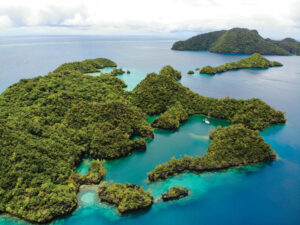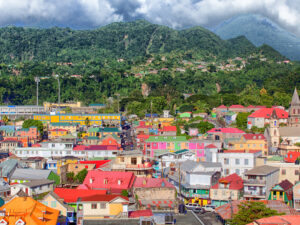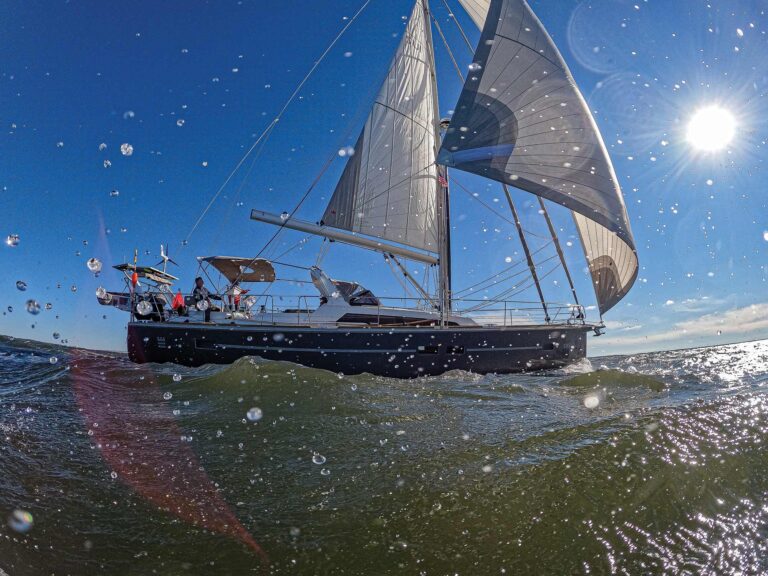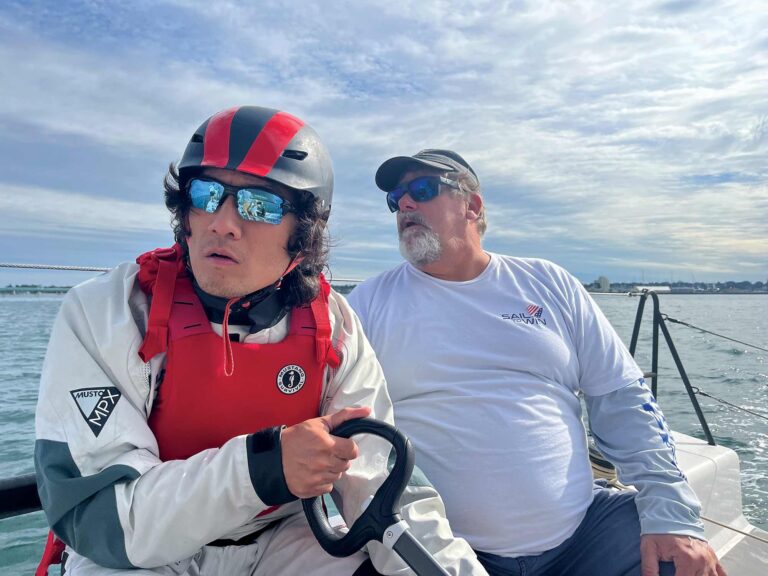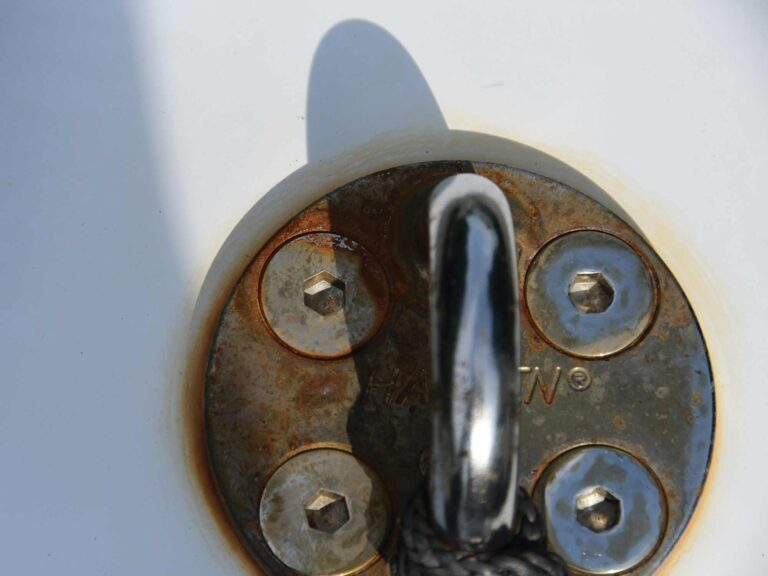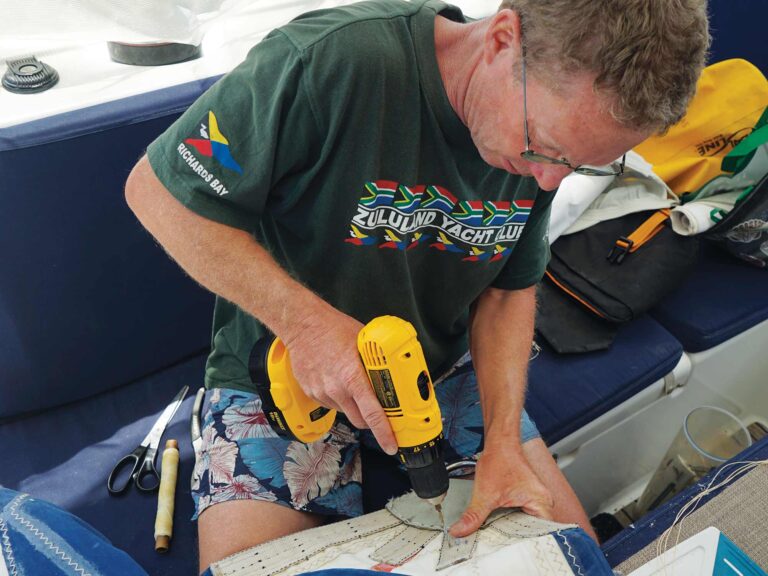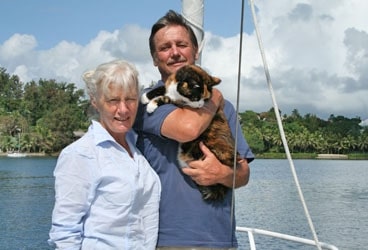
Alvah Simon and Family 368
An elderly man in a rumpled tracksuit was waiting for us as we approached the wharf in the historic tuna town of Aburatsu on Kyushu Island. I no sooner threw our line around the bollard than he asked in halting English, “Do you drink?” How is it they can spot me from across a bay? I nodded.
He smiled, pointed to six on his watch and said, “Be ready.” As he shuffled away I asked Diana, “Was that an invitation or a warning?”
At 6 p.m. he appeared on the dock, this time dressed in a dapper dinner jacket and dress pants. I invited him onboard, but he shook his head no, and indicated we should follow him. We walked down a narrow lane, turned through a sculpted garden, and entered a grand house by local standards. In the lobby he offered us slippers, as no outside shoe ever touches the floor of a Japanese home.
In a Western-style living room he pressed a tumbler of 18-year-old Japanese whiskey into my hands, a glass of white wine into Diana’s, and dropped us into plush lounge chairs. Classical violin music wafted from the stereo. Diana’s head turned like an owl’s as she tried to politely take in the European antique furniture, Rodin sculptures, delicate porcelains, and sets of lead crystal.
An enthusiastic gulp of whiskey seemed to shake loose some long forgotten English words from our host, Oshi. Slowly, he communicated that he is a local business owner, now retired, and his company has fallen on “depression time.”
The rest of the expansive house was authentic Japanese style: stark yet elegantly decorated large rooms with tatami straw flooring, divided by rice paper screens that can be moved to create open or intimate spaces as the mood dictates.
We passed the formal dining room with the signature low table and cushions but were led instead into a comfortably cluttered modern kitchen. Moving with the grace of a dancer (which indeed she is), his wife, Heroko, fussed over an exquisite tempura dinner. The Japanese like to “eat with their eyes,” thus the presentation itself was a work of art.
The sake was seductively delicious and Oshi wouldn’t let my glass rest empty. With dictionaries, photographs, and doodle pads we communicated as best we could about our lifestyles and differing cultures.
As it must, talk turned to the roles of men and women. He explained that he didn’t need to say “please” or “thank you” or “I love you” to Heroko because they were one spirit. As an old-fashioned and dutiful wife she nodded her head in agreement but her eyes seemed to say “Why don’t you try it just once?”
Oshi was puzzled how a Western relationship could work with essentially two bosses. I told him that in our family there was definitely only one boss. He smiled in agreement, and went to fill my glass yet again. I asked Diana to hold her chopsticks above my head. Then as if a puppet at her command I covered my glass with a jerky movement and said in a wooden voice, “Oh, no more sake for me, thank you. Tea would be fine.” That broke them up completely. I feared Oshi would fall out of his chair. Heroko just howled in delight.
When we could talk again, Oshi asked, “What do you read?”
“History, politics, and travel.”
He handed me an English translation of the Japanese constitution. “Read this. We talk tomorrow, six o’clock. You like Sushi?”
That night I laid the American Constitution next to the Japanese and took some notes. The philosophy, style, and structure are eerily identical down to specific phrases, with two important differences: the inclusion of the Emperor as a titular head of state, and the total renunciation of war as a means of settling international disputes, thus banning for all time a Japanese military.
The next night Oshi appeared at precisely 6:00 and led us home again. Over an equally stunning Sushi meal he quizzed me like a demanding schoolteacher. He was very pleased I noted the similarities and differences, and especially that I had not missed the irony in America’s recent insistence that Japan take up more “responsibility” for their own defense.
The atmosphere was warm and wonderful, and it seemed Oshi could not get enough of our company.
“Tomorrow, Sukiyaki!” he announced grandly.
We could not bear the thought that Heroko would spend Mother’s Day slaving over a third consecutive feast for us, so we declined. It was an awkward moment, for upon reaching 65, a Japanese man is venerated, and never, ever contradicted. But when we explained that our culture demanded that we have them to the boat before we could possibly accept any more hospitality, he understood completely.
The next day we laid out elaborate tea and cakes for Heroko, their daughter Maki, and Oshi. What we take for granted was a magical experience for them. The scale and Bristol condition of the galley, births, and salon area appealed to their sense of order and space.
On departure, Oshi declared, “Tomorrow my house. Yakitori!”
When we finally sailed out of Aburatsu, Diana told me to look back. On the outer breakwater stood a lone figure in a rumpled tracksuit, wildly waving goodbye.
I waved and shouted, “Next year, New Zealand. Lamb!”



